MercoPress. South Atlantic News Agency
Argentine election: the Kirchners' Falklands policy has backfired spectacularly
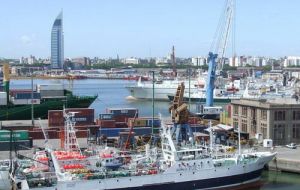 In December 2011, the other Mercosur countries agreed, at her urging, to close their ports of ships flying the Falkland Islands flag.
In December 2011, the other Mercosur countries agreed, at her urging, to close their ports of ships flying the Falkland Islands flag. 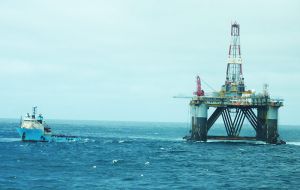 In 2013, it was announced that oil executives linked to drilling in the Falklands would be arrested if they set foot in Argentina.
In 2013, it was announced that oil executives linked to drilling in the Falklands would be arrested if they set foot in Argentina. 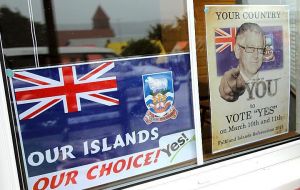 The 2013 Referendum provided a resounding commitment to remaining a BOT and a globally visible demonstration of Falklands' self-determination at work.
The 2013 Referendum provided a resounding commitment to remaining a BOT and a globally visible demonstration of Falklands' self-determination at work. 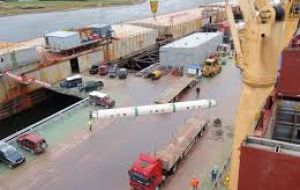 Far from squeezing the economic life out of the Falklands, the Kirchner years have turned them into a media-savvy and politically active community.
Far from squeezing the economic life out of the Falklands, the Kirchner years have turned them into a media-savvy and politically active community. 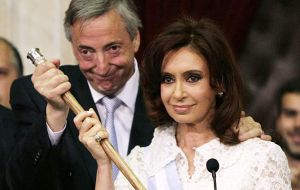 The Kirchners have turned one and perhaps two generations of Falkland Islanders firmly against any kind of co-operation with Argentina.
The Kirchners have turned one and perhaps two generations of Falkland Islanders firmly against any kind of co-operation with Argentina. By Dr Alasdair Pinkerton - For the first time in 12 years, the new occupant of the Casa Rosada, the presidential palace in Buenos Aires, will no longer bear the surname Kirchner.
This is the constitutionally mandated end of a political chapter that began with the election of Nestor Kirchner as president in 2003 – and which survived the political succession of his wife Cristina in 2007, Nestor’s death three years later, and Cristina’s re-election in 2011.
Many on the centre-left of Argentine politics will fear the gradual rolling back of the popular (and populist) social welfare measures that have defined ”Kirchenerismo”. Many on the political right will scent an opportunity to tackle corruption and resuscitate the zombie-like Argentine economy, which has been dogged by defaults on international loans and the manipulation of official economic data.
For Falkland Islanders, the political passing of the Kirchners might seem justifiable cause for raucous celebrations in the pubs and government offices of Stanley. After all, their lives and livelihoods have been hit hard by aggressive Argentine policies during the Kirchner years.
Trade links between the Falklands and Latin America have been curtailed, vital cruise ship tourism has been threatened and the Argentine government has sought to turn the “Malvinas” dispute into a pan-Latin American fight against the last vestiges of colonialism.
And yet, over the same period, the Falkland Islands has engineered a remarkable social, political, cultural and economic revival. The islands' government, far from succumbing to Kirchnerismo measures, has been emboldened by it, with Cristina Fernández de Kirchner an ideal (if unintentional) villain.
Blind alley
The direction of travel for Kirchnerismo foreign policy was clear from the outset. As soon as Nestor took power, the policy of automatic alignment with the US was ditched in favour of stronger ties with Russia, China and Latin American neighbours and the government quickly began prioritising the distinctively “southern” concerns of its Patagonian leaders.
Within months of Nestor’s inauguration, his government proposed discussions with the UK over scheduled flights from Argentina to the Falkland Islands. This seemingly reasonable suggestion came with two rather important caveats: that any discussions would be strictly bilateral ones between the UK and Argentine governments and that all charter flights to and from the Falklands would, with immediate effect, be banned from passing through Argentine airspace.
Bilateralism deliberately excluded Falkland Islanders from participating in discussions on their own future; the charter flights issue revealed a new willingness in Argentina to undermine the Falklands’ economy by restricting connections to other countries. Unsurprisingly, the negotiations never took place.
Four years later, in 2007, the Nestor Kirchner government scrapped the “Joint Declaration” (signed in 1995) that had guaranteed joint UK-Argentine cooperation in oil hydrocarbon exploration in the southwest Atlantic. Energy companies active in the Falkland Islands were, in turn, banned from also operating in Argentina.
Cristina Fernandez de Kirchner has continued her late husband’s approach. In December 2011, the other Mercosur countries agreed, at her urging, to close their ports of ships flying the Falkland Islands flag. This was followed in 2012 by a ban on all British-flagged ships (including Royal Navy vessels on official tours) entering the province of Buenos Aires. In 2013, it was announced that oil executives linked to drilling in the Falklands would be arrested if they set foot in Argentina.
Running alongside these economic sanctions, Cristina has thrown her weight behind high-profile public campaigns that have both pushed Argentine sovereignty claims and challenged islanders' claims to self-determination. Many of these have been developed by Daniel Filmus, a loyal Cristina supporter and Argentina’s first Secretaría de Asuntos Relativos a las Islas Malvinas (Secretary for Matters Relating to the Malvinas Islands). She has courted celebrity endorsements for Argentina’s cause and publicized them widely – often on her own Twitter account.
She has offered the presidential seal of approval to TV and newspaper adverts that deal with the issue, including a secretly filmed advert which showed Argentine Olympic hopeful Fernando Zylberberg “training” on the Falkland Islands during the run up to the London Olympics in 2012. The ad was notable for its complete and rather eerie absence of Falkland Islanders.
And yet, for all the Kirchners' hard and soft geopolitics, the Falkland Islands have arguably never been economically stronger, more politically determined or more diplomatically confident.
Growing confidence
Falkland Island waters, already home to well-managed and sustainable fisheries, may well yield substantial hydrocarbon resources in the not-too-distant future. The revised 2008 Constitution has strengthened the Falklands as a democratic and self-governing territory and the 2013 Referendum provided both a resounding commitment to remaining a British Overseas Territory but also a globally visible demonstration of Falkland Islands self-determination at work.
On the diplomatic stage, too, islanders have met Argentina’s challenge and have proven to be articulate spokespeople at the UN and elsewhere. Younger islanders have been particularly effective advocates on social media, sharing their message in Spanish as well as English.
Far from squeezing the economic life out of the islands, the Kirchner years have turned them into a media-savvy and politically active community. With their vote-chasing grandstanding, the Kirchners have turned one and perhaps two generations of Falkland Islanders firmly against any kind of co-operation with Argentina.
Herein lies the lesson for the Kirchners’ successor. Until Argentina once again treats the Falklands-Malvinas issue as both a diplomatic and fundamentally human problem and not an object of domestic political opportunism, the islanders will continue to turn away from their nearest neighbor and forge their own future.
As the Argentine political scientist Carlos Escude conceded: “If policy was intelligent we could discuss agreements that could bring certain benefits to Argentina. What we have currently generates no benefit at all. It has become a problem for a long list of governments to come.”
Reversing this position will not be easy. The incoming president will need a new vision for the South Atlantic – and the political strength to change course.
(*) Dr Alasdair Pinkerton, Senior Lecturer in Geography & Geopolitics; Admissions Tutor; Department of Geography; Royal Holloway University of London; Egham, Surrey




Top Comments
Disclaimer & comment rules-

-

-

Read all commentsYears of Kirchners in power: 12
Nov 24th, 2015 - 12:10 pm 0Concessions gained from the Falkland Islands: 0
If that doesn't scream massive failure, then I'm unsure what does.
The CFK policies backfired not only with respect to the Falklands, but in most other areas of management as well. Argentina is poorer and weaker today for her failed governance. Fortunately, Macri is not the populist sort who lives for the applause of the descerebrados.
Nov 24th, 2015 - 12:40 pm 0“Until Argentina once again treats the Falklands-Malvinas issue as both a diplomatic and fundamentally human problem and not an object of domestic political opportunism, the islanders will continue to turn away from their nearest neighbor and forge their own future.” This is an important comment that all Falkland Islanders should note and remember.
Nov 24th, 2015 - 01:00 pm 0First of all, remember that argieland and argies lie habitually. Argieland spent a period of about 10 years trying to be “friendly”. Then Kirchner (deceased) realised he wasn't getting any closer to sovereignty. And tore up co-operation on fishing and hydrocarbons.
Remember that argieland is an enemy. Even maintains its claim to your homes. Even if they get rid of that bit of their constitution, they can put it back an hour later. Do not trust for at least 50 years. Remember mythology “I fear Greeks, even those bearing gifts”. All being well, they don't have the patience. What have they done FOR you in the last 50 years?
Commenting for this story is now closed.
If you have a Facebook account, become a fan and comment on our Facebook Page!